Aug
24
2011

James Jordan comments on the erroneous assertion of a “Covenant of works”:
[An] error, which has plagued some Calvinistic theology for generations, is to think that there were two covenants: a covenant of works and a covenant of grace. It is the phrase “covenant of works” that is the problem. Theologians vary in how far into error they go as they try to use this bad term, but one way or another the idea seems to be that Adam was supposed to earn eternal life through good works. Since he failed, Jesus came and did it for us. This error is compounded when some theologians say that we “receive” the “covenant of grace” by faith, as if Adam was supposed to earn his merits apart from faith!
Continue reading
3 comments | tags: Covenant Theology, Genesis, James Jordan, Roman Catholicism | posted in Biblical Theology, Quotes
Aug
16
2011

“All those who hate me love death.” Proverbs 8:36
Ralph Smith notes that Western culture, particularly the United States, is suffering from a clash of two worldviews, two competing narratives that “vie for the right to define our world.”
A review of the biblical story already sets the biblical worldview against much modern thought. The theory of evolution, of course, contrasts sharply with the miraculous creation of the world in six days and man’s special creation as the image of God. The story of Adam and Eve as the original family stands in stark, if implicit opposition to all forms of racism, feminists’ denial of different sexual roles for male and female, homosexuality, and polygamy, to name only a few areas in which contemporary thought clashes with the Christian worldview.
Continue reading
Comments Off | tags: Culture, Evolution, Genesis, Ralph Smith | posted in Apologetics, Biblical Theology, Creation, Quotes
Jul
28
2011

The Bible so often seems to be very descriptive when we don’t want it to be (concerning architecture, for instance) and threadbare when it comes to the personal and illustrative detail we have been trained to enjoy and rely upon. When it comes to characterization especially, somehow the authors do a whole lot with very little. In fact, the unfathomable depth of what they do could not be achieved in any other way. What we moderns have often classed as primitive literature is in fact a literary world whose navigation requires one to keep one’s wits every step of the way. What is not said very often speaks volumes, especially when a passage is repeated with minor tweaks, additions or omissions. The Bible is most definitely smarter than we are, and its literary strategy can be traced back to Eden.
Robert Alter asks:
How does the Bible manage to evoke such a sense of depth and complexity in it representation of character with what would seem to be such sparse, even rudimentary means?
Continue reading
1 comment | tags: Genesis, Literary Structure, Robert Alter | posted in Apologetics, Quotes
Jul
27
2011
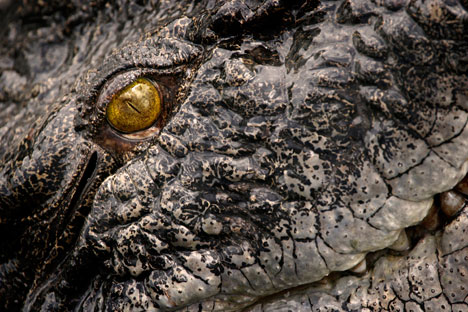
“And God said, ‘See, I have given you every herb that yields seed which is on the face of all the earth, and every tree whose fruit yields seed; to you it shall be for food. Also, to every beast of the earth, to every bird of the air, and to everything that creeps on the earth, in which there is life, I have given every green herb for food’; and it was so.” Genesis 1:29-30
“‘Every moving thing that lives shall be food for you. I have given you all things, even as the green herbs.’” Genesis 9:3
We can’t accurately imagine what the pre-Fall world was like. If there was no death for Adam, was there animal death? And if there was animal death, was there death for things like bacteria?
NOTE: THIS POST HAS BEEN EXTENDED AND REMIXED AND INCLUDED IN GOD’S KITCHEN.
Continue reading
Comments Off | tags: Ascension, Flood, Genesis, Noah, Revelation | posted in Biblical Theology, Creation
Jul
9
2011
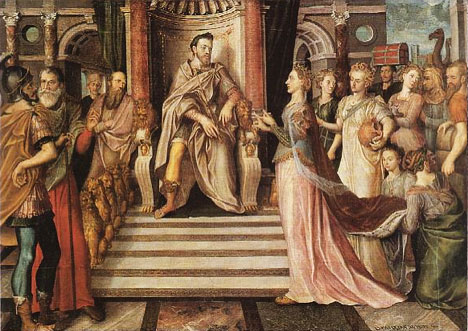
Well, here’s Day 6 at last, and the end of Genesis 1 (this is a really bad chapter division!)
Here’s the rest of this series: 1 2 3 4 5
In this final act of Creation, the Lord puts the lords in the palace. As James Jordan observes, ancient kings sat on thrones of beasts. As king, Solomon was enthroned over lions. His priestly government, imaged in the bronze sea, was enthroned over twelve “tribal” sacrificial bulls, carrying the living water to the nations. And in the Revelation, we see the four beasts filled with eyes beneath the throne of God. The animal kingdom was, in some important sense, to become Adam’s throne.
If you’ve read Bible Matrix, you’ll also have seen that Israel’s history follows the Creation Week, with the four Gentile “beast” empires preceding the final “empire of The Man” Christ Jesus (Daniel 7). Using the matrix, we can also see that the initial history in Daniel 1-6 follows the same pattern, with Daniel’s “dominion” over the lions (turning them into “mutes”) situated at Day 6. And, of course, Noah was also enthroned over those “from afar off.” And then, looking at the entire biblical history, at the Last Day, Jesus will be the one fully enthroned over every enemy, with every “beastly” mouth stopped.
Continue reading
Comments Off | tags: Creation Week, Daniel, Genesis, James Jordan, Literary Structure | posted in Bible Matrix, Biblical Theology, Creation
Jun
28
2011
or Holy Smoke
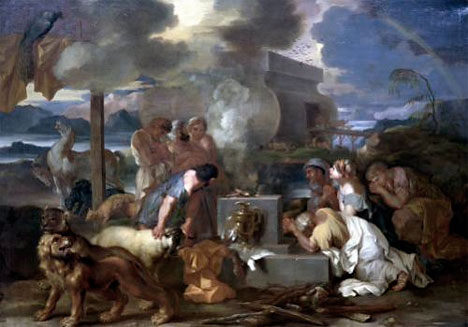
Doug Wilson writes:
“The debate in the early church was not whether the Jews should stop circumcising their sons; it was whether the Gentiles had to start. The decision of the Jerusalem council was not that individual Gentiles did not have to be circumcised. If circumcision had been required of them, it would have obligated them to live as Jews under the Mosaic law — which included the circumcision of all subsequent generations. Circumcision was not being waived for individual Gentiles; circumcision was being waived for Gentiles and their seed. So the Christian church did not insist that Gentiles circumcise their infants — not because they were infants, but because they were Gentile infants” (To a Thousand Generations, pp. 68-69).
Since there is no ex-plicit proof of infant baptism, Pastor Wilson’s self-stated, continuing goal here is to find im-plicit proof. My goal in the following is to show that not only do circumcision and baptism not correspond, but also that the solution to the dispute in this passage he refers to is given in the passage, leaving no room for an im-plicit reference to infant baptism.
Continue reading
16 comments | tags: AD70, Baptism, Circumcision, Covenant Theology, Culture, Doug Wilson, Federal Vision, Genesis, James, James Jordan, John, Literary Structure, Noah, Peter Leithart, Revelation | posted in Bible Matrix, Biblical Theology, Ethics, The Last Days
Jun
4
2011
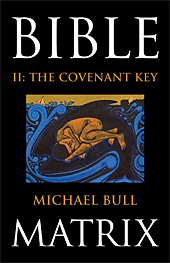
.
When Adam saw the two trees at the centre of the Garden, he was looking at the heart of the Trinity.
Continue reading
2 comments | tags: Communion, Genesis | posted in Bible Matrix, Biblical Theology
Apr
27
2011
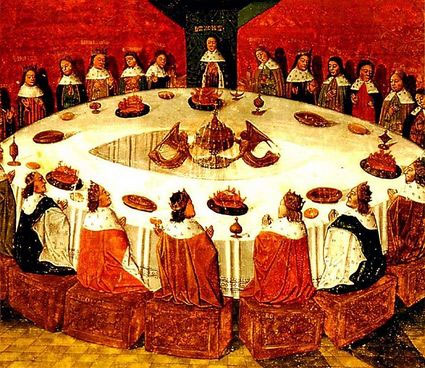
Have been chewing on Covenant renewal in Communion a lot. I’m starting to think the emphasis on the Table is not so much nourishment as resurrection and commission under oath.
Continue reading
Comments Off | tags: Baptism, Communion, Covenant Theology, Exodus, Genesis, Numbers 5 | posted in Biblical Theology, Christian Life
Apr
6
2011
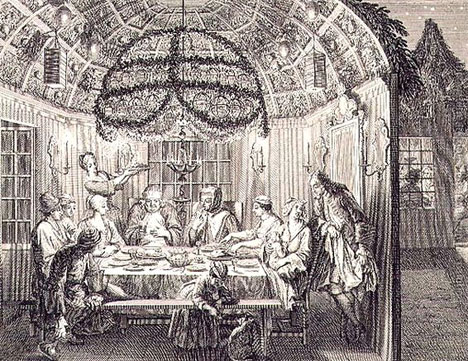
“…how we feast and celebrate is a reflection of our beliefs concerning the salvation of the world.”
Sermon Notes on Deuteronomy 14:22-29 – Part 3
Guest post by Michael Shover
Gathering Clouds
There is another aspect to the Feast of Booths that we need to take into consideration. The sacrifices. During the Feast of Booths, 70 bulls were sacrificed. 13 on the first day, 12 on the second, 11 on the third, 10 on the fourth, 9 on the fifth, 8 on the sixth, 7 on the seventh which equals 70. Then 1 on the last day. Why 70? What is the significance of the number 70? The 70 bulls represented the 70 nations of the world as outlined in Gen. 10. The 1 bull that was sacrificed on the eighth day represented Israel. The 70 bull sacrifices represented the ingathering and atonement for the 70 nations of the world. Salvation was accomplished by Israel for all the nations.
Continue reading
2 comments | tags: Deuteronomy, Genesis, Tabernacles | posted in Biblical Theology
Apr
2
2011
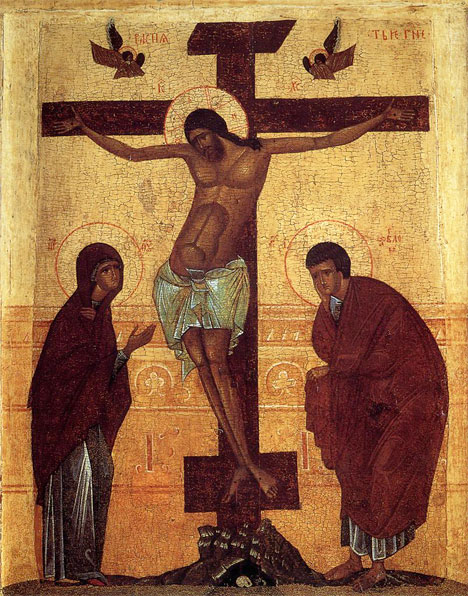
“The priest shall take some of the blood of the trespass offering, and the priest shall put it on the tip of the right ear of him who is to be cleansed, on the thumb of his right hand, and on the big toe of his right foot.” Leviticus 14:14
This is one of those weird things we Christians don’t like to talk about. But James Jordan loves to talk about the weird things. He says somewhere that these three bloody points on the body plus circumcision make a cross. Well, there are certainly four points, but does it look like a cross to you?
Continue reading
Comments Off | tags: Genesis, Holy Spirit, James Jordan, Lampstand, Leviticus, Tabernacle | posted in Biblical Theology


































